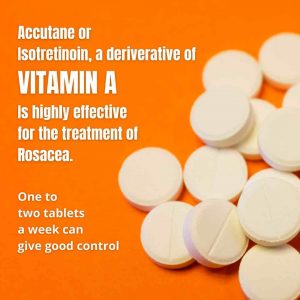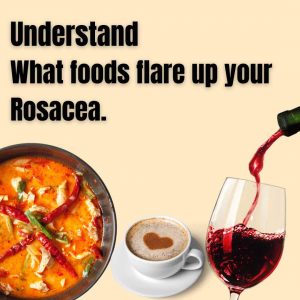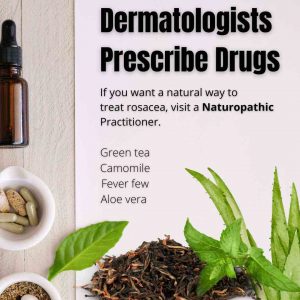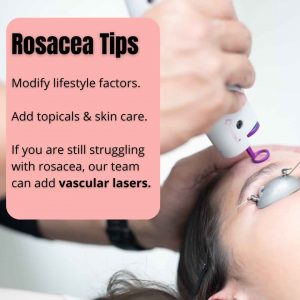Rosacea Natural Remedies
- Best ResultsVariable
- Treatment RecoveryNA
- Procedure TimeNA
- Skin SpecialistNot a Dermatologist
- Duration of ResultsVariable
- AnaestheticNA
- Back to WorkNA
- Cost$
Rosacea Natural Remedies
Rosacea Natural Remedies include elimination diets, herbal & botanical supplements as well as essential oils. Diet is a major contributor to rosacea flare ups. Avoidance of trigger factors can improve disease. Vitamin B3 & azelaic acid are naturally sourced elements that can reduce skin inflammation. Reducing stress levels can reduce flares.
FactsFacts on Rosacea Natural Remedies
- Natural remedies encompass supplements, dietary changes & lifestyle choices including stress management
- Topical azelaic acid & vitamin B3 can reduce skin inflammation
- Sulphur based topicals can help calm inflamed skin
- Some naturopaths advocate gut cleansing
- Mite reduction strategies can decrease demodex infestation
- For a natural solution, consult a naturopathy, dietician, or herbalist
- Dermatologists are the last port of call for naturopathic remedies

Rosacea Natural Remedies
This is the first product you should consider if you are looking for a natural solution for your skin. Niacinamide or B3 can be used topically on inflamed areas. This vitamin can-
- Reduce inflammation, hence its use in acne, pimples, zits, & redness.
- Help repair skin barrier function. Barrier function is compromised in conditions such as acne, rosacea, dermatitis & eczema.
- Reduce free radical damage caused by UVR & pollutants. Vitamin B3 can potentially decrease skin cancer.
Look for a formulation of between 5 to 10%. Apply as tolerated once a day. This vitamin is best combined with other ways to reduce inflammation, see below.
What is azelaic acid?
This acid is a naturally occurring compound found in grains such as barley, wheat & rye. It is also found on your skin as yeasts synthesise this dicarboxylic acid.
Azelaic acid has many actions on the skin including anti-inflammatory roles (best for rosacea), antioxidant, anti-pigmentation properties as well as antimicrobial properties. This acid can potentially reduce demodex mite counts on the skin. See below for explanation. Formulations range from 10-20%, apply once to twice a day, as tolerated.

Disclaimer: I am a procedural dermatologist; I do not prescribe topicals for rosacea unless it is for adjunctive therapy during your laser course.
What is sulphur & can it help rosacea?
Sulphur is an oldie but a goodie. As you know it is part of the periodic table & hence it is natural. Sulphur works via several mechanisms to reduce rosacea symptoms & signs. Firstly, it is anti-inflammatory, secondly it kills demodex mites on the skin.
Look for a formulation containing 5% sulphur. This can be compounded as a stand alone or with sodium sulfacetamide & a beta hydroxy acid. The most popular formulation goes something like this: 5% sulphur +10% sodium sulfacetamide + 1-2 % salicylic acid in the lotion base of choice.
Directions are- use as a wash, then reapply to face, leave on for 20-30 minutes then wash off. Increase the application time by 30 minutes per week. If tolerated, leave on overnight, then wash off.
Disclaimer: I do not prescribe this lotion unless it is adjunctive management post laser therapy. You can get his prescription online or your GP, naturopath, herbalist can source it for you. Some compounding pharmacies make this prescription.
Can vitamin A help treat rosacea?
Yes, vitamin A drugs or derivatives of vitamin A can be very useful for acne rosacea. One 5 mg capsule is equal to at least 3.8 kg of polar bear liver. (look it up, polar bear liver has a very high amount of vitamin A)

Topicals, namely retinol & retinoids creams can help a minority of patients. These must be carefully titrated. Be guided by your medical dermatologist.

View our Treatment Gallery
What skin care to avoid?
Lots. If you suffer from rosacea, you will have sensitive skin. As a rule, you need to approach skin care with thought & precision. You need to be analytical & patient or sh*t will happen (flare-ups). As a rule, avoid these compounds-
- Tea tree oil, a favourite amongst naturopaths, the contact dermatitis rate is high.
- Retinoids, a favourite amongst dermatologists, the irritant rate is high.
- Vitamin C or L-ascorbic acid. Good formulations have a low pH of <2.5. It can burn & cause irritation.
- AHA including glycolic or lactic acid. The pH can be lower than 2.2. Application will flare up rosacea in most patients.
If in doubt, patch test (see below). Some rosacea patients can tolerate OTC retinoids including retinyl palmitate. Beta hydroxy acids, in low doses of <2%, short contact can be beneficial as it is anti-inflammatory.
How to test patch a product?
Always test patch a product at least one week before full face application. To do a test patch, apply a small amount in front of your ear. Do this as directed but half the application frequency. In most cases it means application every second night. If you do not have any reaction, increase as tolerated to involve your face.
Once you can tolerate every second day application, increase the frequency. If you flare up, back right off, use a bland emollient, then restart when your skin has completely healed. If you think you may have an allergic reaction to a product, a medical dermatologist (not me), can potentially investigate via patch testing.
Rosacea, treated with V BEAM Prima, by @candelamedicalanz
Version 2 of rosacea management via stories, tap for the algorithm as to how to manage rosacea. This will be part of my pre-consultation process once I iron out the bugs. Please provide feedback🙏🏼
Idea of this venn diagram during my consultation today with Beauticate content writer @zoebriggsbeauty 💯
🔬Skin Science: It is complex. Essentially rosacea is genetic, with input from many external factors as listed below. Unlike the aetiology of #rosacea, skincare should be simple
.
👉Settings 11 mm spot, 6 ms, 6.5 J
.
🔫Laser: The V Beam is one of the best lasers for vascular work, primarily because of its dynamic cooling spray. I do have devices such as IPL/BBL & 1064 Nd Yag lasers with cooling plates but I personally don’t like them much
.
👍🏻Advantage of spray: fire & forget, it’s on, it’s safe, it’s more comfortable for the patient
.
👉Coupling gel & cooling plates: Adds many more steps as to what can go wrong
.
👉Gel required
.
👉Enough coupling gel needed
.
👉Cooling plate needs to be cold
.
👉Contact with the gel throughout the process
.
👉No feedback if cooling is fault
.
👉Then you gotta clean up your mess
.
👍🏻Just my 2 cents worth on vascular lasers
.
😎Davin Lim
Dermatologist
Brisbane🇦🇺
.
#vbeam #vbeamprima #rosacea #rosaceatips #rosaceatreatment #roscaeacure #rosaceaskincare
#drdavinlim #dermatoloigstbrisbane #skinscience
.
🔬Skin science: Rosacea skincare is tricky. Start slow, titrate, analyse what you can tolerate & what flare up your skin
.
☀️Sunscreen is essential. Most will tolerate LRP Anthelios, either chemical or hybrid physical (depending on which country you live in). Invisible Zinc if you want pure physical SPF
.
👊Actives: Stick with hyaluronic acid, niacinamide, & azelaic acid
.
😳What about retinol/retinoids? It is not an absolute contraindication, but you will require care & titration
.
🔫What about procedures? Lasers over chemical peels. Lasers include vascular laser, QSL, #pico, #dermaltoning, laser genesis. If you want #Fraxel or ablative CO2, cover with doxycycline for 3 weeks, add vascular laser for rebound redness
.
🎬Action: Book a consult with my colleagues & clinical team @cliniccutis
.
👍🏻Management & options: Surf the algorithm in the stories. This is version 1.2, still requires more branches, feedback will be great (including any bugs you have found). I have based answers on probability not possibility, taking into account the time vs completion rate to maximise information & minimise drop-outs. As the algorithms evolve I will allow for ‘skip’ segments to allow faster completion times, or more detail for those wanting it
.
😎Davin Lim
Dermatologist
Brisbane🇦🇺
@cliniccutis
.
#drdavinlim #drdavinlim #skin #skincare #rosacea #rosaceaskin #rosaceatreatment
#rosaceaskincare #rosaceasupport #rosaceacommunity #rosaceacure #dermatologist
#dermatology #dermatologistbrisbane #rosaceatips #skinrejuvenation #rosaceaskinrejuvenation #cutisclinic
.
🔬Skin science: Rosacea & acne are two separate entities, however overlaps are common, hence acne rosacea. Further complicated of late due to #maskne
.
👉How to tell? Can be hard. If there are comedones, it's acne, however blackheads & whiteheads can be difficult to spot. More vascular instability with rosacea, exceptions include fixed rosacea & steroid induced rosacea. Rosacea usually flares with sun, acne can get better (porphyrins via c.acne activated by blue & red light in the visible spectrum). Food flares are more common in rosacea, food groups different. Many more differences including distribution, presence of teles, as well as cyclical flares (seen more commonly in hormonal acne)
.
👀Ocular signs: seen in 25-30% of rosacea, not in acne
.
👉Prognosis: Acne can be largely cured, rosacea is chronic
.
📖Management: Many posts on both, look out for new stories on branching algorithms as I am doing testing ATM
.
😎Davin Lim
Dermatologist
Brisbane🇦🇺
#drdavinlim #drdavinlim #skin #skincare #rosacea #rosaceaskin #rosaceatreatment
#rosaceaskincare #rosaceasupport #rosaceacommunity #rosaceacure #dermatologist
#dermatology #dermatologistbrisbane #rosaceatips
.
.
👀Rosacea triggers: These are as individual as you are. Getting to know and learn what triggers your rosacea will give you an edge over this common skin disorder. Triggers include sun-UV exposure, stress, heat, wind, exercise, ETOH, foods, changes of weather, wind, & skin care products (esp acidic or low pH products)
.
.
🥵Sensitive skin + Rosacea: For my rosacea patients, I normally start you on #niacinamide before other topicals, as this compound is anti-inflammatory. B3 can be combined with other topicals as long as the pH is over 5.0. #retinol with caution, #ascorbicacid with EXTREME caution. For further information discuss your skin care issues with my clinical team @cliniccutis
.
.
🔍Who to see if you have rosacea? Your family physician can guide you with treatments, including the use of topicals such as #rozex & azelaic acid. Tabs include anti-inflammatory meds can be prescribed by your GP. Vascular lasers & #IPL can reduce both inflammation as well as redness associated with rosacea. Attempt to control your condition with the usual topicals & tabs prior to seeing a dermo
.
.
💉Last line treatments: Patients that fail laser can give #Botox & #tixel a trial or micro-Botox with #aquagold
.
.
😎Dr Davin Lim, Dermatologist
Brisbane. Australia
🇦🇺
.
#skincare #skinscience #healthyskin #skinscience #rosaceaskincare #nomorered #skincarescience #drdavinlim #davinlim
.
Disclaimer: I am a procedural dermatologist, namely I laser-lase, inject, & cut. Skin care, though important, is not my usual occupation. I do give out sensible advice pertaining to your procedure. For an in-depth analysis of topicals, discuss your concerns with my clinical team @cliniccutis 👍🏻💯or discuss medical options with your dermatologist
What does gut health & dysbiosis have to do with rosacea?
Some naturopaths believe that there is an association between rosacea, intestinal overgrowth, guy inflammation & dysbiosis.

Based on this theory, correcting dysbiosis with gut-healing may reduce background inflammation. Some say it can reduce redness, acne, pimples & even swelling associated with rosacea. Naturopaths focus on an elimination diet that addresses triggers (hot food, spicy foods) & focuses on an anti-inflammatory Mediterranean diet.
What foods to eat?
Firstly, figure out what your triggers are. The best way is to keep a rosacea diary. Next optimise your dietary intake with prebiotic & probiotic foods.
Avoid- refined packaged & processed foods including meat, sugar, refined flour, processed vegetables. Avoid or markedly reduce alcohol.
Eat- prebiotic high fibres foods, at least 25 grams daily. Substitute vegetable oil for olive oil. Supplement with omega 3 fish oil. Supplement with anti-inflammatory herbs like cloves, turmeric, ginger & sage.

Disclaimer: I am a procedural dermatologist. My skill sets are not dietary/naturopathic; however dermatologists acknowledge dietary contribution can be significant in most cases of rosacea. Sorting out your diet can make a difference in some, & in some cases prevent dermatologists from prescribing drugs such as antibiotics & vitamin A derivatives including Accutane. My job is the dude that you see last, I laser.
What supplements can help rosacea sufferers?
Some herbal supplements & essential oils can help reduce inflammation. This can reduce rosacea flares. This is the list of the usual essential oils & plant-based extracts normally prescribed for rosacea.

Aloe vera is the go-to plant for skin inflammation. You can either use the sap of the plant, or buy prepacked gel extracts. Contact dermatitis is a rare side effect.
Camomile can be used as a drink (tea) or topically as compresses. Low chance of allergic contact dermatitis.
Green tea: probably has the most medicinal properties & merit. It is a potent antioxidant with scientific data. Drink it, it’s good for you.
Fever few is another plant. It has antioxidant properties as well as very mild sun protection- in theory.
Other botanical extracts include raw honey, ginger, rosemary & thyme. Consider using other naturally derived extracts including azelaic acid & niacinamide topically.
What essential oils can help?
Essential oils like lavender, jasmine, rose, tea tree, thyme etc. have anti-inflammatory and healing properties. Be guided by your naturopath as you will only require 2-3 drops of any essential oil. Your naturopath can guide you as to the application techniques. You can order these oils online & watch a YouTube video on how to use/apply.
As a guide do not apply to broken skin, or if you have compromised skin barrier function. This can increase your chances of allergic reactions / dermatitis. If you develop flare ups, stop immediately & consult your medical dermatologist. I am a procedural dermatologist; in the context of rosacea my work involves lasers.
Does stress play a role in rosacea?
Hell yeah. Stress can flare up any skin condition including acne, eczema, psoriasis, vitiligo & certainly rosacea.
Managing stress effectively can reduce rosacea flare ups as it reduces triggers & skin inflammation. The best person to discuss ways to manage stress is a psychologist, psychiatrist or naturopath.
Disclaimer: My job is laser work for recalcitrant rosacea. I am generally the last person you see if all other avenues fail, this includes management of stress, trigger factors, diet & conventional therapy.
What are natural toxins that can help reduce rosacea flare ups?
Botulinum toxin type A (BTX A) is a naturally occurring product, from clostridium bacteria. BTX A works on the acetylcholine receptors to reduce muscle contraction. It also is a modulator of inflammation. By reducing muscle contraction in blood vessel walls, it reduces intermittent spasms of capillaries & can be useful to treat redness, flushing, & blushing.
BTX also markedly reduces the population of demodex mites on the skin. Demodex infestation is one of the causes of rosacea. BTX only lasts 3-6 months, & cost between $690 to $990, depending on the extent of treatment. This is one of my last line therapies if the laser fails.
Can allergies give rise to rosacea?
Yup, allergies can make your condition worse. Essentially, there are two allergies to be considered. Firstly, a food allergy or intolerance, an example is the ubiquitous gluten that is blamed for everything including acne, psoriasis & rosacea. If you would like to find out if gluten is a culprit, see a dietician, do a gluten elimination diet, record your outcomes in your rosacea diary.
Secondly, allergic contact dermatitis. Rosacea patients have a compromised skin barrier, this can lead to an increase in both irritant & allergic dermatitis. This can be due to common chemicals such as fragrance, propylene glycol, sodium lauryl sulphate, preservatives, alcohol, & the dearth of essential oils that you may have used. This type of allergy is best managed by a medical dermatologist (not me). They can arrange specialised testing called patch testing & can extend the battery of tests to include your own topicals.
What sunscreen to use?
UV is a trigger in over 80% of cases. The best sunscreen is the one that does not irritate your skin & is cosmetically elegant. Some rosacea patients do not tolerate chemicals. Other rosacea patients don’t like the idea of applying chemicals on the skin. If this is the case, you can consider elemental metals as these are organically sourced from the periodic table of chemistry, namely zinc & titanium dioxide.

As a guide, physical sunscreens are better tolerated than chemical sunscreens. Try before you buy. Invisible Zinc is a favourite amongst dermatologists.
Why is a flare up diary important?

A flare-up diary can assist in identifying potential triggers. Try to write down all flare-ups quickly, recording what you did before the flare up happened. For example, record your diet, skin care application, sun exposure, stress levels that day. You must keep a diary to have any hope of establishing a blueprint for your skin.
The National Rosacea Society recommends a Rosacea Diary Booklet, which you can download on their website. This helps you learn what all kinds of triggers aggravate rosacea and gives you a journal to write them down in.
What are natural ways dermatologists treat rosacea?
If you really want to go all natural, dermatologists are the last people to see. We prescribe drugs including long term antibiotics as well as vitamin A tablets called isotretinoin or Roaccutane. The flipside is that our prescription patterns are calculated bearing in mind a risk benefit ratio. At any given time if you feel like stopping your medication, go ahead.
If you are after natural treatments, a combination of vitamin B3 or niacinamide topically, coupled with natural light or light amplification by stimulated emission of radiation (lasers) may temporarily suppress your rosacea. I cannot cure your condition, perhaps a naturopath can.
Disclaimer: I am a procedural dermatologist; this means my work is laser-based (in the context of rosacea). If you see me for laser work, I may give you a prescription for anti-inflammatory medications short term. You have the option of filling out the prescription. I am not here to convince you to trial conventional medications, however by giving you a prescription, I have fulfilled my duty of care.
How can lasers treat rosacea?

Lasers can help reduce the signs & symptoms of rosacea. They work via two main pathways. Firstly, they can target redness, including broken capillaries & veins. Secondly, they can reduce skin inflammation. Most patients require 2-4 sessions to control their rosacea. In summary-
Types of lasers I use: V Beam vascular laser, Prima, Perfecta, LP Nd Yag, IPL, BBL.
Recovery: 1-3 days, mild swelling in most.
Treatment time: 5-10 minutes.
Pain level: well tolerated as the laser has in-built cooling.
Cost: $370 – $690 with partial Medicare rebates in most cases.
Davin’s Viewpoint on Natural Remedies for Rosacea
Rosacea is a complex condition that can be improved with natural treatments. You are best served by seeing a naturopath or a dietician if you are inclined for alternative treatments, reserving the role of medical dermatologists for more resistant cases.

The most valuable tips I can give for organic methods to treat rosacea are as follows-
- Skin care. Keep it simple. Consider anti-inflammatory vitamins such as niacinamide or vitamin B3. Azelaic acid is a naturally sourced molecule from grains. Use this once a day. Use natural elemental zinc or titanium dioxide (they are found on the periodic table, hence classed as natural). Sun protection is essential.
- Diet is super important if there are specific foods that exacerbate your condition. The only way you are going to find out is if you keep an accurate food diary. As a guide, hot spicy foods are often flare factors. For more information on anti-inflammatory foods, see a dietician or naturopath. Simple antioxidants such as green tea & turmeric are banal. They can be sourced from any health food shop.
- Lifestyle modification: reduce stress. See a psychologist, or a psychiatrist. The latter will prescribe you psychotropic drugs. If you want to go all natural, do yoga, meditate or get an acupuncturist to stick some needles in trigger points.
- Light can help. If you are afraid of lasers, consider light sources that can be anti-inflammatory. These include diodes or yellow light. One session a week for 6-8 weeks can potentially reduce inflammation. Lasers are better.
- Lasers including pulse dye laser, long pulsed NdYag or IPL can help reduce inflammation.
- Toxins are natural. They include botulinum toxin type A from clostridium bacteria. It works by modulation of inflammation. Yes, it is called Botox. This in my last line treatment for rosacea, it can be argued that it is a naturally sourced chemical,
Dermatologists encourage lifestyle changes to help you control your skin flare ups. In some cases, it can give a marked improvement in your rosacea signs & symptoms. If you are still struggling to control your disease, see a dermatologist. Remember, they prescribe drugs, not fairy dust.


